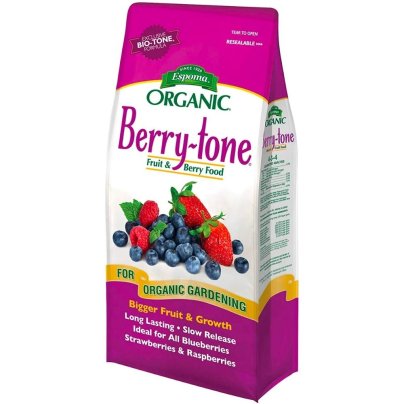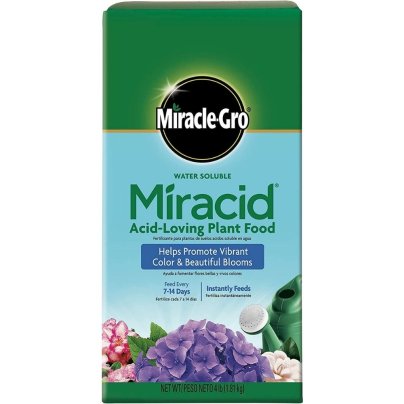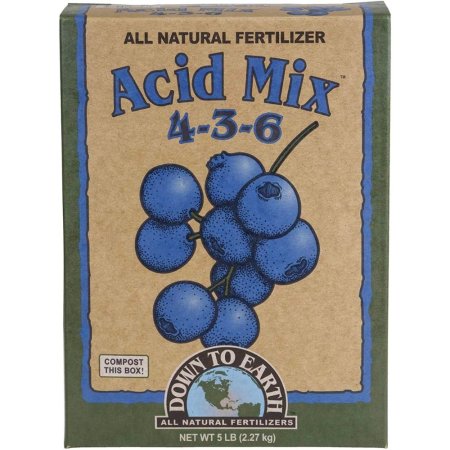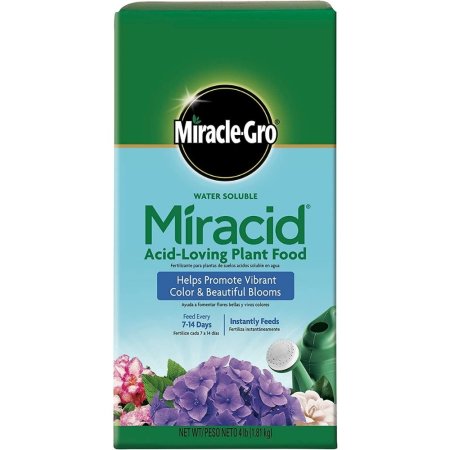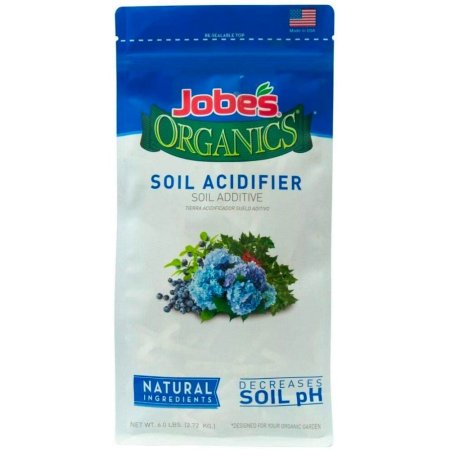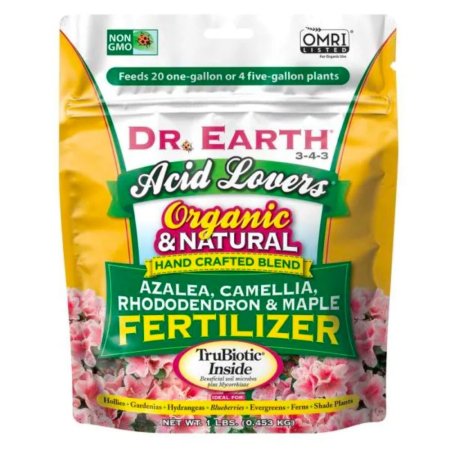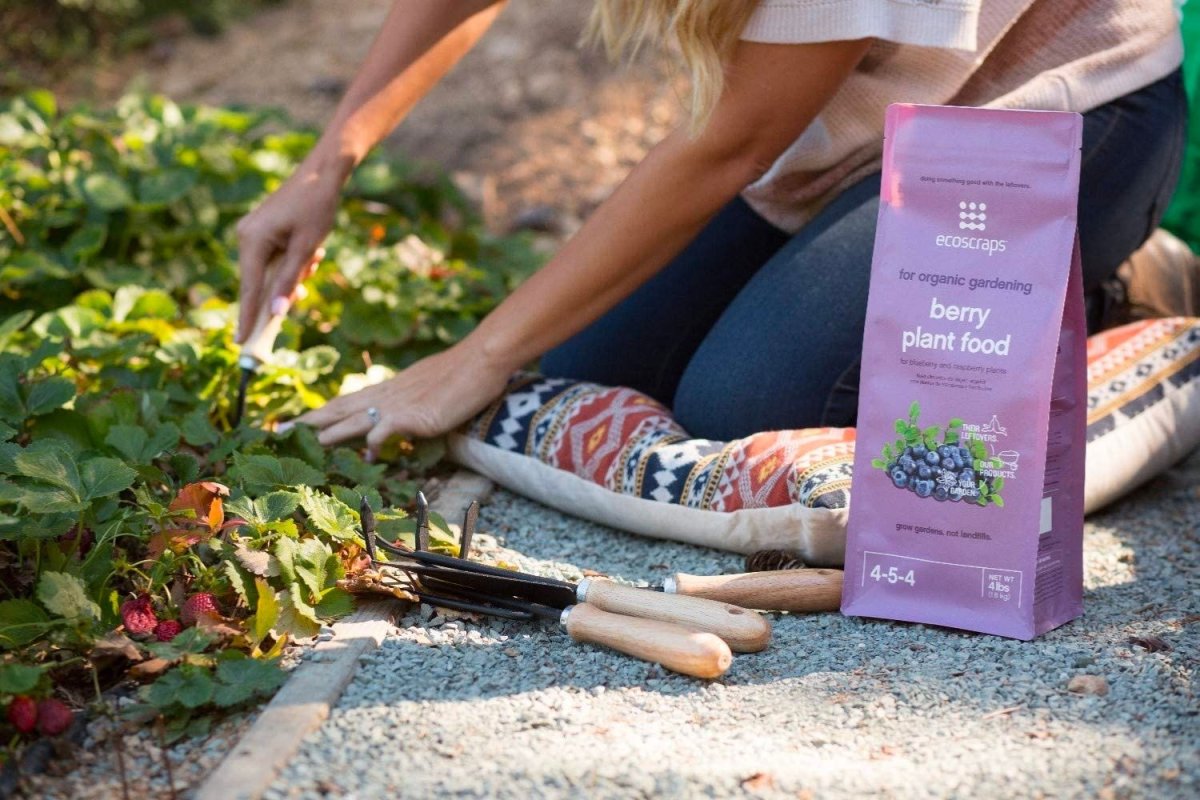
We may earn revenue from the products available on this page and participate in affiliate programs. Learn More ›
Homegrown blueberries make a tasty addition to pies, muffins, and other baked goods, and they’re delicious right off the bush. Growing blueberries is a relatively low-maintenance task in terms of their fertilization needs, since most growers typically follow a regimen of only fertilizing blueberry bushes a couple of times each year. Choosing the correct fertilizer for blueberry plants is essential to the plant’s ability to thrive.
With so many types of fertilizers available, it can be difficult for shoppers to narrow down the options. To help make the search easier, the following recommendations were selected for their quality formulas, versatility, and value. Keep reading to learn about some of the key features to consider when shopping for the best fertilizer for blueberries, and then explore some of the top picks organized by each product’s winning features.
- BEST OVERALL: Down to Earth All Natural Acid Mix Fertilizer
- BEST ORGANIC: Espoma Organic Fruit & Berry Food
- BEST INORGANIC: Miracle-Gro Water Soluble Miracid Plant Food
- BEST ACIDIFIER: Jobe’s Organics 9364 Fertilizer
- ALSO CONSIDER: Dr. Earth Organic Acid Lovers Fertilizer
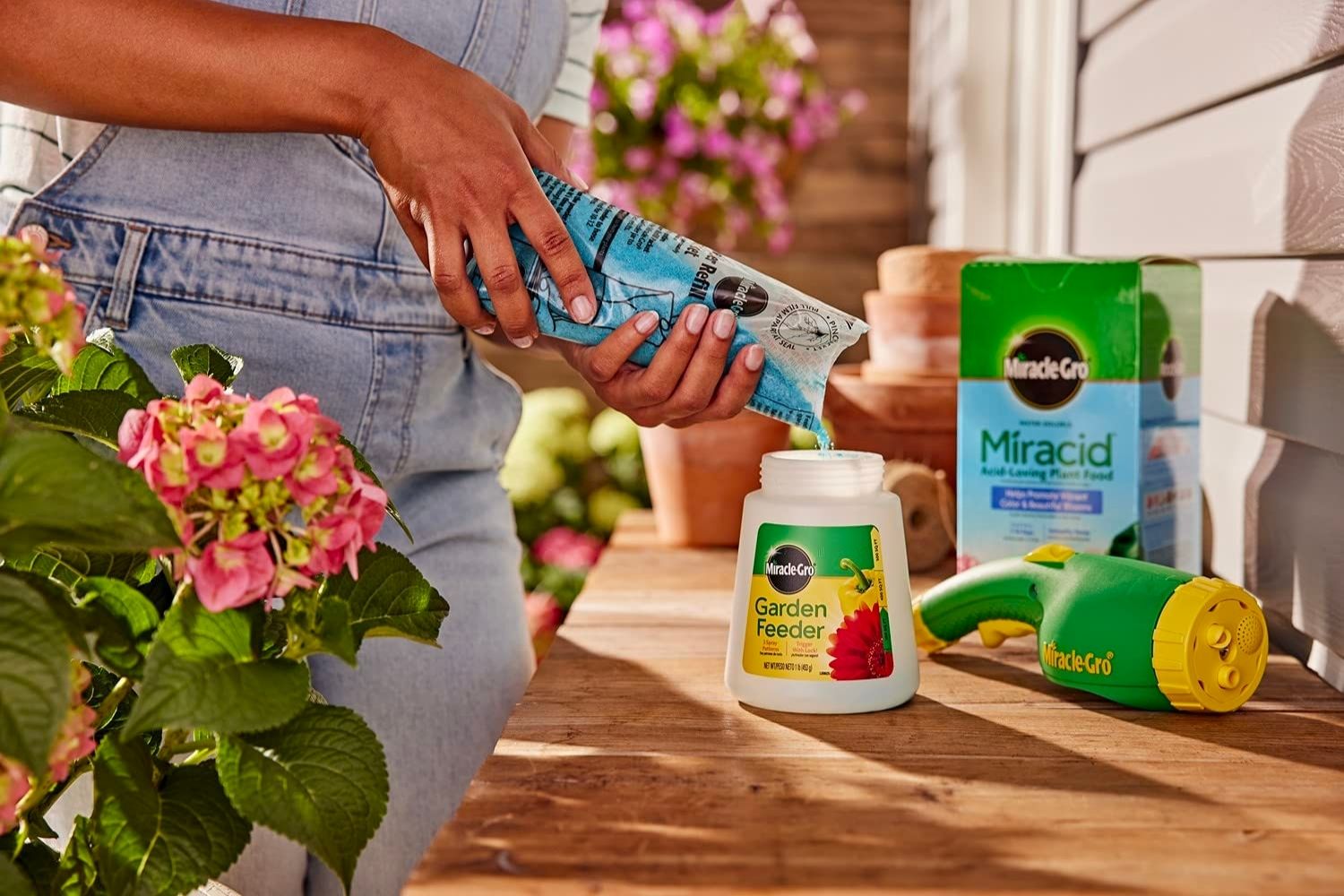
What to Consider When Buying the Best Fertilizer for Blueberries
While it’s easy to assume that all fertilizers offer similar performance, a number of factors affect their appropriateness for different plants. For example, a fertilizer that works well for a gardener’s current plants might not be the best fertilizer for raspberries and blueberries. Consider several important features when choosing the best fertilizer for your blueberry bush, including its required nutrients, acidity level, and the fertilizer’s form.
Types of Fertilizer for Blueberries
Many fertilizer products are available, making it difficult to narrow down the options. First, decide on the preferred type of fertilizer, which generally falls under two main categories: organic and inorganic.
- Organic fertilizers are made entirely with natural ingredients and continue to fertilize the soil as the season progresses. Look for organic fertilizers that contain blood meal, fish meal, seaweed, or sphagnum peat moss. DIY organic fertilizers like coffee grounds and eggshells also can help regulate acidity levels.
- Inorganic fertilizers, which are made with synthetic ingredients, are designed to work immediately to fertilize plants. They typically contain higher quantities of the key macronutrients than those in organic formulas. Unlike organic fertilizers, which may have an unpleasant smell, inorganic products are usually odorless.
Another way to narrow down the choices is by considering the preferred form of fertilizer. Fertilizers for blueberries are sold in either a liquid or powder formula.
- Liquid fertilizers are designed to be diluted with water and work immediately to deliver essential nutrients.
- Powder and granular fertilizers are crafted to sprinkle onto the soil and then be mixed or raked in. Since they release nutrients over time, they are ideal for blueberry plants, which don’t have to be fertilized frequently.
Acidity of Soil
Like other acid-loving plants, including rhododendrons, azaleas, hydrangeas, and strawberries, one of the essential requirements for growing blueberries is acidic soil. Although they grow best in soil with a pH level between 4.5 and 4.8, most soil in the United States is not naturally acidic.
Before planting, test the soil’s pH level by using a home pH test kit or sending it out for a professional evaluation. To ensure the soil is sufficiently acidic, many gardeners mix in sulfur before planting.
Fertilizers also can impact a soil’s pH level. Choose a fertilizer that’s designed for acid-loving plants that will work to lower pH levels. Look for a fertilizer containing ammonium sulfate or sulfur-coated urea, both of which lower soil pH levels.
Nutrients and NPK Ratio
The three macronutrients in plant fertilizers are nitrogen (N), phosphorus (P), and potassium (K). The balance of these nutrients is listed by its NPK ratio, which indicates the percentage of each nutrient in the fertilizer. A balanced fertilizer has an NPK ratio of 10-10-10 or similar.
Blueberries usually thrive when they receive a fertilizer that’s high in nitrogen since it strengthens the plant’s root system. Be wary, however, of fertilizers containing nitrates like calcium nitrate or chloride, because they can negatively impact—or even kill—a blueberry bush.
Since fertilizers formulated specifically for blueberries are hard to come by, shoppers can look at products designed for azaleas or rhododendrons, which have similar nutritional needs.
Our Top Picks
Knowing more about blueberry bush care and the plant’s fertilization requirements can help narrow the numerous choices available. To make the search even easier, consider the following selections, which are some of the best blueberry fertilizer options for a garden.
Best Overall
Down to Earth All Natural Acid Mix Fertilizer
Pros
- Biodegradable packaging
- Ideal NPK ratio
- Made with all-natural ingredients
Cons
- May have an unpleasant smell
Product Specs
- Organic/Inorganic: Organic
- Quantity: 5 pounds
- NPK Ratio: 4-3-6
Down to Earth’s All Natural Acid Mix Fertilizer contains cottonseed meal, fish bone meal, kelp meal, and humic acids, all of which provide nutrients while keeping pH levels low. It’s high in nitrogen, which helps roots grow, and potassium to help with fruit production.
This fertilizer comes in a 5-pound bag, but a smaller 1-pound bag is also available for those who want to test it before committing to a larger quantity. While it’s perfect for blueberries, it’s also suitable for other acid-loving plants, including rhododendrons, azaleas, camellias, hydrangeas, evergreens, raspberries, strawberries, and potatoes.
Down to Earth recommends using this fertilizer three times per year: in early spring, when the first blooms appear, and in the fall after harvest.
Get the Down to Earth fertilizer on Amazon and at Walmart.
Best Organic
Espoma Organic Fruit & Berry Food
Pros
- Made with organic ingredients
- Contains key micronutrients like sulfur and magnesium
- Instant and slow-release nitrogen
Cons
- May have an unpleasant smell
Product Specs
- Organic/Inorganic: Organic
- Quantity: 4 pounds
- NPK Ratio: 4-3-4
Espoma’s Fruit & Berry Food contains 4 pounds of all-natural fertilizer as well as key ingredients such as feather meal, poultry manure, bone meal, alfalfa meal, sulfate of potash, sulfate of magnesia, and elemental sulfur. The NPK ratio is 4-3-4, and the formula also contains 3 percent calcium, 1 percent magnesium, and 5 percent sulfur to satisfy the plants’ nutritional needs.
The nitrogen in the formula is further broken down into water-soluble and water-insoluble ingredients so that the plants receive an instant dose of nutrients while the slow-release formula works over time.
Get the Espoma plant food on Amazon and at Walmart.
Best Inorganic
Miracle-Gro Water Soluble Miracid Plant Food
Pros
- High macronutrient percentages
- Formulated specifically for acid-loving plants
- Fast-acting, water-soluble formula
Cons
- Made with synthetic ingredients
Product Specs
- Organic/Inorganic: Inorganic
- Quantity: 4 pounds
- NPK Ratio: 30-10-10
For plants that need an instant dose of fertilization, inorganic formulas are the best choice since they start delivering nutrition as soon as they’re applied. They also tend to offer much higher macronutrient percentages. This formula from Miracle-Gro, designed specifically for acid-loving plants like blueberries, features 30 percent nitrogen, 10 percent phosphorus, and 10 percent potassium.
It’s a water-soluble granular formula, so it acts quickly to deliver nutrients almost instantaneously. Simply add 1 tablespoon of the fertilizer to a gallon of water and apply it to the soil for a quick dose of both macronutrients and micronutrients.
Get the Miracle-Gro plant food on Amazon and at Walmart.
Best Acidifier
Jobe’s Organics 9364 Fertilizer
Pros
- Organic formula
- Naturally lowers pH levels
- Safe to use around pets and children
Cons
- Must be paired with a traditional fertilizer
Product Specs
- Organic/Inorganic: Organic
- Quantity: 6 pounds
- NPK Ratio: 0-0-0
Although Jobe’s Soil Acidifier may not deliver any key macronutrients and isn’t a traditional fertilizer, it may be a good choice. It can work in tandem with a typical fertilizer to ensure the blueberry plant’s soil remains at the correct pH level throughout the season.
The formula is completely organic, and it consists primarily of elemental sulfur and gypsum. To use on established plants, use 1½ cups of the acidifier for each foot of branch spread and rake it into the top layer of soil. This product works just as well for hydrangeas as it does for blueberries.
Get the Jobe’s soil acidifier on Amazon.
Also Consider
Dr. Earth Organic Acid Lovers Fertilizer
Pros
- Organic formula
- Naturally lowers pH levels
- Made with feed-grade ingredients
Cons
- May have an unpleasant smell
Product Specs
- Organic/Inorganic: Organic
- Quantity: 4 pounds
- NPK Ratio: 3-4-3
Dr. Earth’s Acid Lovers Fertilizer, which contains alfalfa meal, fish bone meal, feather meal, and kelp, has an NPK rating of 3-4-3. According to the manufacturer, this product is suitable for azaleas, camellias, rhododendrons, maples, hollies, gardenias, hydrangeas, blueberries, evergreens, ferns and shade plants. It contains microbes and mycorrhizae (beneficial fungi), which not only help to ensure nutrients are properly broken down but also to increase drought resistance.
Use this fertilizer before planting by adding 2 cups of the formula to each cubic foot of soil. Work the fertilizer into the soil.
Get the Dr. Earth fertilizer at Amazon, The Home Depot, and Walmart.
Our Verdict
After reviewing many different fertilizers for blueberry plants, we recommend the Down to Earth All Natural Acid Mix Fertilizer for its natural pH-balancing ingredients, excellent NPK ratio, and biodegradable packaging. For fast results and a high quantity of key macronutrients, consider the inorganic Miracle-Gro Water Soluble Miracid Plant Food.
How We Chose the Best Fertilizer for Blueberries
Years of experience covering home and garden products as well as extensive product research went into creating this guide. We explored more than 20 fertilizer options and weighed a number of practical considerations before making our recommendations.
- Organic vs. inorganic: Both organic and inorganic fertilizers have advantages, so we included both types in our recommendations.
- Acidity: Soil acidity is so important to the success of a blueberry plant that we prioritized fertilizers containing ingredients that help lower soil pH levels.
- Value: Since plant fertilizers vary in type and quantity, we calculated the overall value for the cost for each of our recommendations.
FAQs
While you now know more about choosing the best fertilizer for blueberry plants, you might still want more information about how to grow blueberries, how to care for a blueberry bush, and how to use the fertilizer. Here are some answers to some of the most frequently asked questions about blueberry fertilizer.
Q: How can I make my soil more acidic for blueberries?
Blueberries grow best in soil with a pH that ranges between 4.5 and 4.8. Since most soil in the U.S. is not acidic enough for blueberries, gardeners can prepare their soil by adding sulfur before planting.
Q: Are coffee grounds good for blueberry bushes?
Since coffee grounds tend to be acidic, they make a good DIY fertilizer for blueberries.
Q: Are eggshells good for blueberries?
Eggshells can increase the acidity of garden soil, making the soil better for blueberries.
Q: When should I acidify my soil for blueberries?
Gardeners should test their soil throughout the season to ensure the pH remains between 4.5 and 4.8. If it runs higher than 4.8, a soil acidifier can be added.
Q: How do I acidify soil quickly for blueberries?
Use a soil acidifier like Jobe’s Organics 9364 Fertilizer to quickly make the soil more acidic.
Q: How do I treat reddish leaves on blueberries?
Reddening leaves on a blueberry plant are typically a sign of a magnesium deficiency. To increase magnesium levels in the soil, sprinkle Epsom salts around the plant.

